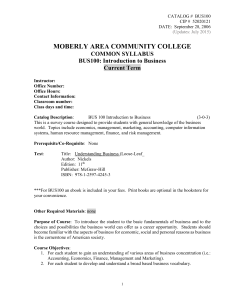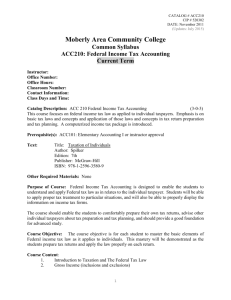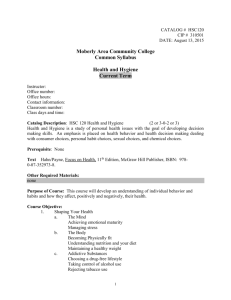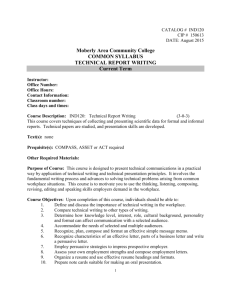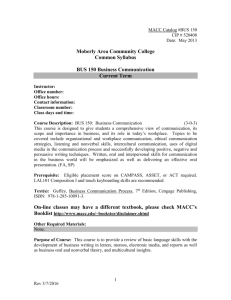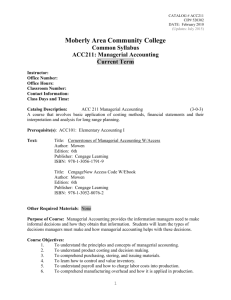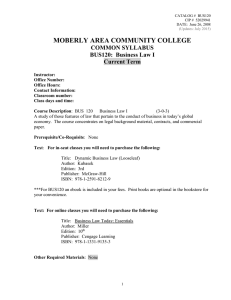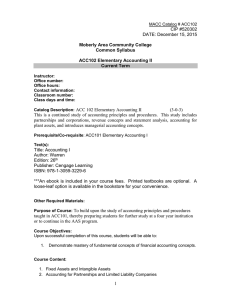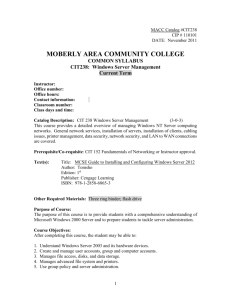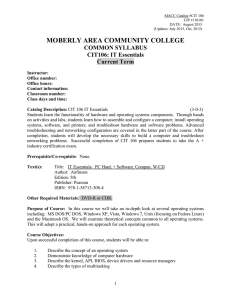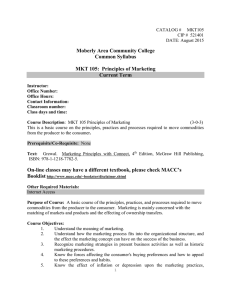BUS 121 Business Law II - Moberly Area Community College
advertisement
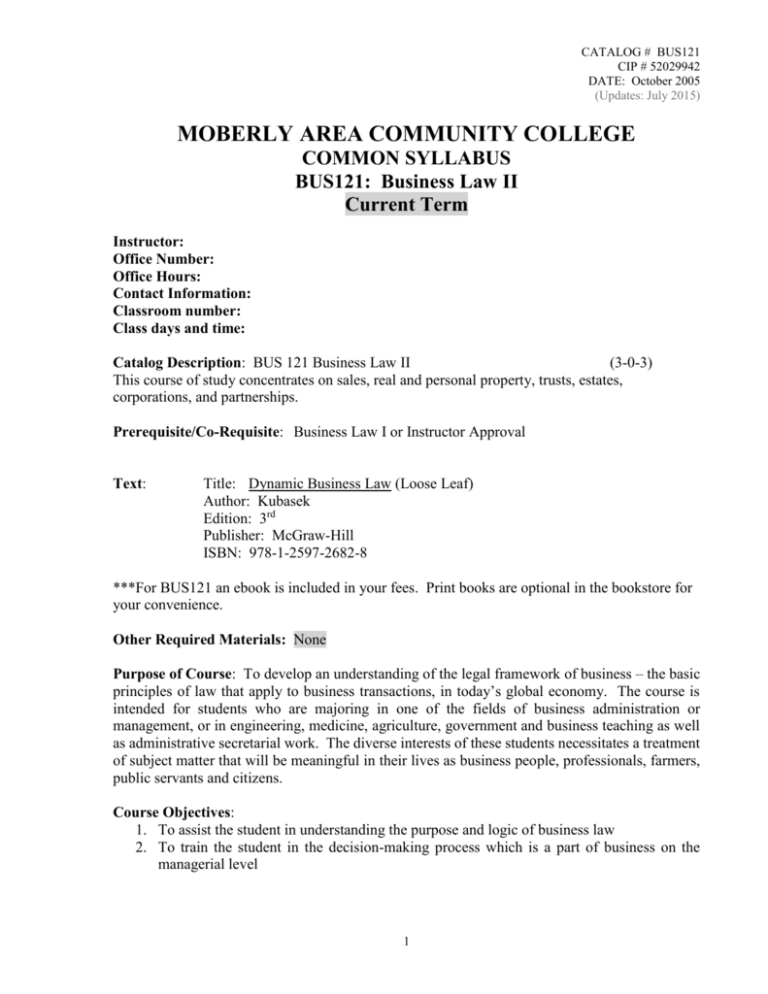
CATALOG # BUS121 CIP # 52029942 DATE: October 2005 (Updates: July 2015) MOBERLY AREA COMMUNITY COLLEGE COMMON SYLLABUS BUS121: Business Law II Current Term Instructor: Office Number: Office Hours: Contact Information: Classroom number: Class days and time: Catalog Description: BUS 121 Business Law II (3-0-3) This course of study concentrates on sales, real and personal property, trusts, estates, corporations, and partnerships. Prerequisite/Co-Requisite: Business Law I or Instructor Approval Text: Title: Dynamic Business Law (Loose Leaf) Author: Kubasek Edition: 3rd Publisher: McGraw-Hill ISBN: 978-1-2597-2682-8 ***For BUS121 an ebook is included in your fees. Print books are optional in the bookstore for your convenience. Other Required Materials: None Purpose of Course: To develop an understanding of the legal framework of business – the basic principles of law that apply to business transactions, in today’s global economy. The course is intended for students who are majoring in one of the fields of business administration or management, or in engineering, medicine, agriculture, government and business teaching as well as administrative secretarial work. The diverse interests of these students necessitates a treatment of subject matter that will be meaningful in their lives as business people, professionals, farmers, public servants and citizens. Course Objectives: 1. To assist the student in understanding the purpose and logic of business law 2. To train the student in the decision-making process which is a part of business on the managerial level 1 CATALOG # BUS121 CIP # 52029942 DATE: October 2005 (Updates: July 2015) 3. To aid students who are preparing for professional examinations. Business Law is one of the areas of subject matter included in several examinations, such as: Certified Public Accountant, Chartered Property and Casualty Underwriter and Certified Professional Secretary. 4. To assist the student in avoiding legal difficulties and to know when he/she should seek the advice of an attorney. 5. The development of a vocabulary that will be helpful regardless of the student’s role in later life. Course Content: 1. Sales and Leases of Personal Property 2. Negotiable Commercial Paper 3. Debtor-Creditor Relationships 4. Agency and Employment 5. Business Organizations 6. Real Property and Estates Assessment of Student Learning: Grading- Grades will be issued according to the following scale: A = 90% - 100% B = 80% - 89% C = 70% - 79% D = 60% - 69% F = 59% - & below Business Administration Program Assessment: The Business Administration faculty continually strive to meet the needs of their students through program improvements. These improvements are a result of program assessments and the consultation and advisement of the Business Administration Advisory Committee. In addition to the course assessments outlined in this syllabus, the objectives achieved in this course will also be an integral part of the BA program assessment. Statement to Connect Course with Technical Program Outcome Statement: In compliance with MACC’s General Education outcomes, the student who successfully completes this course will be able to: I. Demonstrate effective written and oral communication; Description of Major Assignments/Projects A major case out of each chapter of the text is assigned to the class. In this written assignment the student is required to cite the decision and state the relevant rule of law for the decision. 2 CATALOG # BUS121 CIP # 52029942 DATE: October 2005 (Updates: July 2015) Instructor Policies Academic Dishonesty: MACC board policy is as follows: “Academic dishonesty by students damages institutional credibility and unfairly jeopardizes honest students; therefore, it will not be tolerated in any form.” Forms of academic dishonesty include but are not limited to the following: violations of copyright law, plagiarism, fabrication, cheating, collusion, and other academic misconduct. Incidents of dishonesty regarding assignments, examinations, classroom/laboratory activities, and/or the submission of misleading or false information to the College will be treated seriously. The procedure for handling academic dishonesty is outlined in the Student Handbook (Policy Handbook M.010). In cases of alleged academic dishonesty, the burden of proof is on the student, not on the instructor. Attendance: Any student who misses two consecutive weeks of class during a regular sixteen-week semester or the equivalent proportion of class time during a shorter session will be dropped from the class by the instructor unless acceptable justification is supplied. Additionally, any student who misses more than one-fourth of the entire number of in-seat class meetings in a regular 16-week semester or the equivalent proportion of class time during a shorter session, may be dropped from that class by the instructor if, in the opinion of the instructor, the student does not have reasonable opportunity to succeed in the class. A student’s attendance rate will be calculated based upon the first day of the semester (not the student’s date of enrollment in the course). Student attendance must be defined in a different manner for online, hybrid, and virtual courses. Student attendance in these courses is defined as active participation in the course. Online, hybrid, and virtual courses will, at a minimum, have weekly mechanisms for student participation, such as any or all of the following methods: a. Completion of quizzes or exams b. Submission of assignments c. Participation in threaded discussions d. Communication with the instructor A student who does not participate in an online, hybrid, or virtual course for two consecutive weeks will be dropped by the instructor unless acceptable justification is supplied. As with ground courses, a student’s attendance rate in online courses will also be calculated based upon the first day of the semester. If a student does not demonstrate active participation in the online course within the first two weeks (or the equivalent proportion of class time during a short session), the student will be dropped as “never attended.” Simply logging into an online class does not constitute active participation. Students should be aware that their dropping a course and their last date of attendance in the course may impact their financial aid. Tardiness: per instructor’s policy Make-up and late work: per instructor’s policy 3 CATALOG # BUS121 CIP # 52029942 DATE: October 2005 (Updates: July 2015) Extra-Credit: per instructor’s policy Schedule of Student Assignment and Activities: per instructor’s policy ADA Statement Students who have disabilities that qualify under the Americans with Disabilities Act may register for assistance through the Office of Access and ADA Services. Students are invited to contact the Access Office to confidentially discuss disability information, academic accommodations, appropriate documentation and procedures. For more information, please call either the Moberly office at (660) 263-4100 x 11240 or the Columbia office at (573) 234-1067 x 12120, or visit our web page at http://www.macc.edu/index.php/services/access-office. Title IX Statement MACC maintains a strict policy prohibiting sexual misconduct in any form, including sexual harassment, sexual discrimination, and sexual violence. All MACC employees, including faculty members, are considered mandated reporters of sexual misconduct and as such are expected to contact the Title IX Coordinator when they become aware, in conversation or in writing, of an incident of sexual misconduct. For more information on this policy or to learn about support resources, please see http://www.macc.edu/sexual-misconduct-policy or contact Dr. Jackie Fischer, MACC’s Title IX Coordinator, at 660-263-4110, ext. 11236 or jackief@macc.edu. 4
